You are viewing the Cultures of Knowledge Blog archive for the ‘Project Updates’ Category:

As we thaw out from the February cold snap, for our inaugural Selected Record I thought we should be seasonal and start with our own variant of Old Weather. Using the ‘content’ field in basic search, I entered ‘frost’. My trawl brought up a record for a letter from one John Bennett to the antiquary and diarist Thomas Hearne (1678-1735), an EMLO stalwart responsible for 5,180 records in the catalogue. Bennett, I discovered from thirteen other abstracts in the catalogue, is the son of Sir John Bennett, and in a letter of 14 June 1708 he requests letters to be enclosed ‘to my father Sr. John Bennett, Serjeant att Law, Member of Parliament att his house in Essex Buildings in y e Strand, and then they’l be frank’t at y e Posthouse . . . ’; a quick check in the History of Parliament Online confirms this address. Presumably Bennett junior and Hearne knew each other from Oxford (a quick look in the Alumni Oxonienses confirms they were both at St Edmund Hall). The January in which Bennett wrote to his college friend saw a ‘great frost’ descend across Europe, and this is what he refers to with his tale of snow obstructing streets and unfortunate children meeting their ends in the freezing waters of the Thames. Apparently, the sustained chill was caused by decreased sun spot activity during the Maunder Minimum, which led to the coldest winter for 500 years.
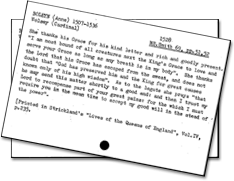 Alongside the harsh winter, Bennett also mentions a variety of people, places, events, and publications, and we are now in the process of capturing these references systematically across all cards using our catalogue’s powerful online editorial interface, EMLO Edit. The Duke of Marlborough, John Churchill – at the head of his army in the Spanish Netherlands over the winter of 1708/9 and midway between the battles of Oudenaarde and Malplaquet – is mentioned en passant, before Bennett turns his attention to more local matters. He speaks of David Gregory (1659-1708), Savilian professor of astronomy at Oxford from 1691 who had died three months previously, and makes an oblique reference to his successor (a quick search on Wikipedia reveals this to be John Caswell, who held office until his death in 1712). A new professor of poetry is mentioned, and he turns out to be another EMLO correspondent, Joseph Trapp (1679-1747) (the first postholder), and Bennett informs us that Henry Sacheverell (1674-1724) was in London during the cold spell and due to preach at St Paul’s. References to publications by Johan Ernest Grabe (1666-1711), the Königsberg-born divine who settled in Oxford and became a chaplain at Christ Church, and by our very own John Selden (1584-1654) are brought into the letter and, almost as an after-thought, Livy, Tully, and Homer are thrown in. This fascinating network of contexts and connections emerge from a single query regarding inclement weather.
Alongside the harsh winter, Bennett also mentions a variety of people, places, events, and publications, and we are now in the process of capturing these references systematically across all cards using our catalogue’s powerful online editorial interface, EMLO Edit. The Duke of Marlborough, John Churchill – at the head of his army in the Spanish Netherlands over the winter of 1708/9 and midway between the battles of Oudenaarde and Malplaquet – is mentioned en passant, before Bennett turns his attention to more local matters. He speaks of David Gregory (1659-1708), Savilian professor of astronomy at Oxford from 1691 who had died three months previously, and makes an oblique reference to his successor (a quick search on Wikipedia reveals this to be John Caswell, who held office until his death in 1712). A new professor of poetry is mentioned, and he turns out to be another EMLO correspondent, Joseph Trapp (1679-1747) (the first postholder), and Bennett informs us that Henry Sacheverell (1674-1724) was in London during the cold spell and due to preach at St Paul’s. References to publications by Johan Ernest Grabe (1666-1711), the Königsberg-born divine who settled in Oxford and became a chaplain at Christ Church, and by our very own John Selden (1584-1654) are brought into the letter and, almost as an after-thought, Livy, Tully, and Homer are thrown in. This fascinating network of contexts and connections emerge from a single query regarding inclement weather.
Miranda is editing metadata from the Bodleian card catalogue of correspondence for our union catalogue, Early Modern Letters Online. On a regular basis, she brings us hand-picked and contextualised records.
Launch Record of the Week
James Brown
January 30, 2012
Events, Front Page, Project Updates, Videos
Tags: CKCC, Databases, Digitization, Geography, Mapping the Republic of Letters, Networks, Spatial Theory, Union Catalogue, Union Catalogue News, Visualization

Videos of twenty-one papers and keynotes from our 2011 conference Intellectual Geography: Comparative Studies, 1550-1700 (Oxford, 5-7 September 2011) are now available on the conference website or via our Vimeo channel (with more hopefully to come). Organised by Howard Hotson, the event introduced and tested the novel concept of ‘intellectual geography’ as a means of appreciating and understanding the organisation of intellectual activity and the dissemination of ideas within space and across time, from the sixteenth to the eighteenth centuries. A taster – Miles Ogborn‘s keynote exploration of ‘What is Intellectual Geography?’ – is provided below. Happy viewing!
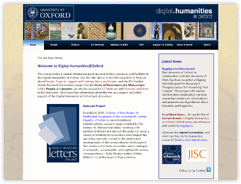 We were this week’s featured project on Digital.Humanities@Oxford, meaning a coveted front-page slot for a brief description of Cultures of Knowledge and the logo for our union catalogue, Early Modern Letters Online. Recently given a facelift and some important new functionality, DH@O is a central hub for information about relevant activities, resources, and activities in Oxford – one of the most established centres of digital humanities in the world – and features a growing relational database of people and projects involved.
We were this week’s featured project on Digital.Humanities@Oxford, meaning a coveted front-page slot for a brief description of Cultures of Knowledge and the logo for our union catalogue, Early Modern Letters Online. Recently given a facelift and some important new functionality, DH@O is a central hub for information about relevant activities, resources, and activities in Oxford – one of the most established centres of digital humanities in the world – and features a growing relational database of people and projects involved.
James Brown
January 11, 2012
Conferences and Workshops, Events, Project Updates
Tags: Animals, Arachnology, Conchology, History of Science, Martin Lister, Natural History, Royal Society, Seventeenth Century
Update: see write-up, photos, and podcasts
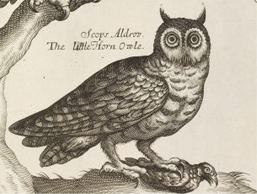
A seventeenth-century rendering of a little horn (or screech) owl.
A day conference on History Comes to Life: Seventeenth-Century Natural History, Medicine and the New Science‚ will be held on Friday 27 April 2012 from 9am to 5.30pm at The Royal Society in London. Organised by our industrious Martin Lister (1639-1712) Research Fellow Anna Marie Roos, and held to commemorate the 300th anniversary of Lister – Royal Physician and the first arachnologist and conchologist – the event will explore the often neglected relationship between medicine and natural history in the seventeenth-century. Featuring an exciting line-up of ten international authorities on early modern science, the meeting will dovetail out from Lister’s work to consider to what extent practices and technologies of natural history changed between the Renaissance and the seventeenth century. It will also explore how the acquisition of natural history knowledge and new schemes of taxonomy influenced the perception and treatment of animals for medical and experimental use. As well as support from Cultures of Knowledge, the conference is sponsored by The John Fell Fund, The British Society for the History of Science, The Royal Society, and the Wellcome Trust. The conference fee is a bargain at £40 (full price) or £30 (student/unwaged). For further details and to register online, please visit the conference webpage. Please address queries to felicity.henderson(at)royalsociety.org.
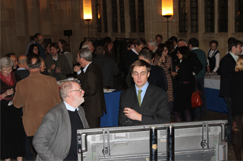
EMLO screenshots captivate the crowd.
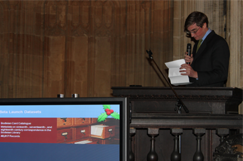
Chris Fletcher sets the scene.
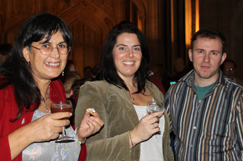
Festive designers and programmers.
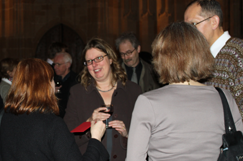
The Lister and Lhwyd research teams.
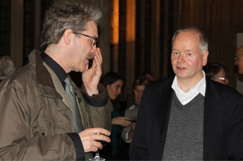
Stephen Clucas and Philip Beeley.
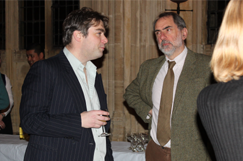
Will Poole and Richard Sharpe.
After a very busy year in private alpha, the Project celebrated the imminent public beta launch of our free union catalogue – Early Modern Letters Online − with a festive reception last Friday. Over eighty students, scholars, librarians, and digital humanists joined us in the historic environment of the Bodleian Library‘s Divinity School, where – over mulled wine, seasonal canapés, and mince pies – they were treated to contextual remarks from Dr Chris Fletcher (Keeper of Special Collections) and Professor Howard Hotson (Director of Cofk), and a full demonstration of the capabilities of the catalogue’s search and discovery, and editorial, interfaces by Project Coordinator Dr James Brown. Many thanks to everyone who contributed to the success of the evening, with a special shout-out to the Bodleian’s Wilma Minty for arranging things with her usual flair.
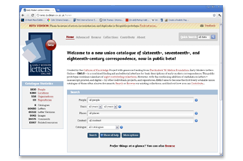
The EMLO homepage.
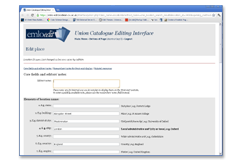
EMLO Edit, the editorial interface.
Early Modern Letters Online – which currently contains 60,480 epistolary records – federates basic metadata from eight contributing sources (including 48,695 sixteenth-, seventeenth-, and eighteenth-century records drawn from the existing card index of correspondence in the Bodleian Library), and allows for their manipulation and further enhancement by means of a sophisticated editorial environment. It will be available to the public from early January 2012.

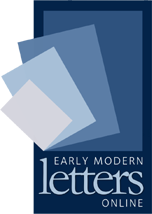 To stay informed, please watch this space or join the Mailing List. In the meantime, we wish you all a very Happy Holidays!
To stay informed, please watch this space or join the Mailing List. In the meantime, we wish you all a very Happy Holidays!
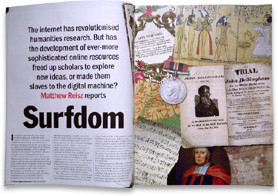 Cultures of Knowledge was featured in a THE survey of digital humanities projects last week. CofK was interviewed alongside staff from the Digital Miscellanies Index, the Old Bailey Online, Linguistic Geographies: The Gough Map of Great Britain, DigiPal, Ancient Lives, the Online Chopin Varorium Edition, and the DIAMM. Here’s how the article described the Project:
Cultures of Knowledge was featured in a THE survey of digital humanities projects last week. CofK was interviewed alongside staff from the Digital Miscellanies Index, the Old Bailey Online, Linguistic Geographies: The Gough Map of Great Britain, DigiPal, Ancient Lives, the Online Chopin Varorium Edition, and the DIAMM. Here’s how the article described the Project:
‘A remarkable project titled Cultures of Knowledge: An Intellectual Geography of the Seventeenth-Century Republic of Letters seeks to reconstruct pan-European intellectual networks by creating a modern equivalent. Many leading thinkers of the time were forced by war to flee from their homes and so left their papers all over the Continent. The digital revolution and the collapse of the Soviet Union, says Howard Hotson, professor of early modern intellectual history at the University of Oxford, have enabled a team based in Oxford (with support from the Andrew W. Mellon Foundation) to build ‘radically multinational forms of international collaboration of a kind which was effectively impossible before’, so as to reassemble in virtual form long-scattered learned correspondences. The project should transform the study of topics such as the Scientific Revolution…’
The article – mischievously entitled ‘Surfdom’ – goes on to raise some important caveats about electronic forms of humanistic research, even though for most digital projects these will serve as reminders of pitfalls and best practice rather than highlights of new or emerging issues. The emphasis on the necessity of crafting digital tools both in the service of research questions and alongside more conventional modes of scholarship is very much up our street as a full-spectrum academic enterprise, while some of the author’s concerns regarding the accessibility, sustainability, and especially accountability of large-scale online resources are also well-taken. Here’s the article; there’s a lively debate in the comments section and on Twitter.

 Alongside the harsh winter, Bennett also mentions a variety of people, places, events, and publications, and we are now in the process of capturing these references systematically across all cards using our catalogue’s powerful online editorial interface, EMLO Edit. The Duke of Marlborough, John Churchill – at the head of his army in the Spanish Netherlands over the winter of 1708/9 and midway between the battles of Oudenaarde and Malplaquet – is mentioned en passant, before Bennett turns his attention to more local matters. He speaks of David Gregory (1659-1708), Savilian professor of astronomy at Oxford from 1691 who had died three months previously, and makes an oblique reference to his successor (a quick search on Wikipedia reveals this to be John Caswell, who held office until his death in 1712). A new professor of poetry is mentioned, and he turns out to be another EMLO correspondent, Joseph Trapp (1679-1747) (the first postholder), and Bennett informs us that Henry Sacheverell (1674-1724) was in London during the cold spell and due to preach at St Paul’s. References to publications by Johan Ernest Grabe (1666-1711), the Königsberg-born divine who settled in Oxford and became a chaplain at Christ Church, and by our very own John Selden (1584-1654) are brought into the letter and, almost as an after-thought, Livy, Tully, and Homer are thrown in. This fascinating network of contexts and connections emerge from a single query regarding inclement weather.
Alongside the harsh winter, Bennett also mentions a variety of people, places, events, and publications, and we are now in the process of capturing these references systematically across all cards using our catalogue’s powerful online editorial interface, EMLO Edit. The Duke of Marlborough, John Churchill – at the head of his army in the Spanish Netherlands over the winter of 1708/9 and midway between the battles of Oudenaarde and Malplaquet – is mentioned en passant, before Bennett turns his attention to more local matters. He speaks of David Gregory (1659-1708), Savilian professor of astronomy at Oxford from 1691 who had died three months previously, and makes an oblique reference to his successor (a quick search on Wikipedia reveals this to be John Caswell, who held office until his death in 1712). A new professor of poetry is mentioned, and he turns out to be another EMLO correspondent, Joseph Trapp (1679-1747) (the first postholder), and Bennett informs us that Henry Sacheverell (1674-1724) was in London during the cold spell and due to preach at St Paul’s. References to publications by Johan Ernest Grabe (1666-1711), the Königsberg-born divine who settled in Oxford and became a chaplain at Christ Church, and by our very own John Selden (1584-1654) are brought into the letter and, almost as an after-thought, Livy, Tully, and Homer are thrown in. This fascinating network of contexts and connections emerge from a single query regarding inclement weather.Letters in Focus with Miranda Lewis















 Join
Join 